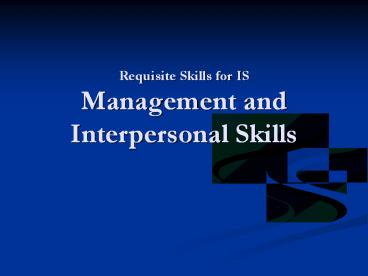Requisite Skills for IS Management and Interpersonal Skills - PowerPoint PPT Presentation
Title:
Requisite Skills for IS Management and Interpersonal Skills
Description:
Requisite Skills for IS Management and Interpersonal Skills Contemplative Questions What skills are important for work in IS? Do I have these skills now? – PowerPoint PPT presentation
Number of Views:240
Avg rating:3.0/5.0
Title: Requisite Skills for IS Management and Interpersonal Skills
1
Requisite Skills for ISManagement and
Interpersonal Skills
2
Contemplative Questions
- What skills are important for work in IS?
- Do I have these skills now? Or, do I need to
acquire them? - Why do I need them?
2.2
3
List of Skills
- Analytical skills (see separate slides)
- Technical skills (see separate slides)
- Management skills
- Resource Management
- Project Management
- Risk Management
- Change Management
- Interpersonal skills
- Communication skills
- Working alone and with a team
- Facilitating groups
- Managing expectations
4
Management Skills for Systems Analysis
- Four categories
- Resource Management
- Project Management
- Risk Management
- Change Management
5
Resource Management
- Systems analyst needs to know how to get the most
out of the resources of an organization,
including team members - Includes the following capabilities
- Predicting resource usage
- Tracking resource consumption
- Effective use of resources
- Evaluation of resource quality
- Securing resources from abusive use
- Relinquishing resources when no longer needed
6
Project Management
- Two Goals
- Prevent projects from coming in late
- Prevent projects from going over budget
- Actually 4 goals time, cost, functionality and
quality - Assists management in keeping track of projects
progress - Consists of several steps
- Decomposing project into independent tasks
- Determining relationships between tasks
- Assigning resources and personnel to tasks
7
Risk Management
- Ability to anticipate what might go wrong in a
project - Minimize risk and/or minimize damage that might
result - Placement of resources
- Prioritization of activities to achieve greatest
gain
8
Change Management
- Ability to assist people in making transition to
new system - Ability to deal with technical issues related to
change - Obsolescence
- Reusability
9
Interpersonal Skills for Systems Analysis
- Mastery of interpersonal skills is paramount to
success as a Systems Analyst - Four types of skills
- Communication skills
- Working alone and with a team
- Facilitating groups
- Managing expectations
10
Communication Skills
- Effective communication helps to establish and
maintain good working relationships with clients
and colleagues - Skills improve with experience
- Three types used by Systems Analyst
- Interviewing and Listening
- Questionnaires
- Written and Oral Presentations
11
Interviewing and Listening
- Means to gather information about a project
- Listening to answers is just as important as
asking questions - Effective listening leads to understanding of
problem and generates additional questions - You have two ears and one mouth use them
proportionately. (ancient proverb) - Seek first to understand, then, to be
understood. (Covey)
12
Written and Oral Presentations
- Used to document progress of project and
communicate this to others - Communication takes several forms
- Meeting agenda
- Meeting minutes
- Interview summaries
- Project schedules and descriptions
- Memoranda requesting information
- Requests for proposals from vendors and
contractors - Oral presentations
13
Steps to Improving Communication Skills
- Practice
- Conduct a training class
- Volunteer to speak
- Videotape presentation and do a self-appraisal of
your skills - Make use of college writing centers
- Take classes on business and technical writing
14
Working Alone and with a Team
- Working alone on aspects of project involves
managing - Time
- Commitments
- Deadlines
- Team work involves establishing standards of
cooperation and coordination - Table 2-2 presents characteristics of a
high-performance team
15
Facilitating Groups
- Involves guiding a group without being a part of
the group - Useful skill for sessions such as Joint
Application Development (JAD) - Figure 2-9 lists guidelines for running a
successful meeting
16
Managing Expectations
- Managing expectations is directly related to
successful system implementation - Skills for successful expectation management
- Understanding of technology and workflows
- Ability to communicate a realistic picture of new
system to users - Effective education of management and users
throughout systems development life cycle
17
Systems Analysis as a Profession
- Standards have been established for education,
training, certification and practice - Several aspects
- Standards of Practice
- Ethics
- Career Paths
18
Standards of Practice
- Endorsed Development Methodology
- Specific procedures and techniques to be used
during development process - Promote consistency and reliability across all of
an organizations development projects - Approved Development Platforms
- Organizations standardize around a specific
platform, sometimes tied to development
methodology
19
Standards of Practice
- Standardization of Roles
- Roles are becoming better defined across
organizations - Development of a Common Language
- Common programming languages
- Common modeling languages, such as Unified
Modeling Language (UML)
20
Ethics
- Professional Ethics
- ACM Code of Ethics See Figure 2-10
- Business Ethics
- Stockholder approach
- Any action taken by a business is acceptable as
long as it is legal and maximizes stockholder
profit - Stakeholder approach
- Any action that violates rights of stakeholder
must be rejected - Social Contract approach
- Any action that is deceptive, can dehumanize
employees or that could discriminate is rejected
21
Career Paths
- Consulting
- Information Systems within a large corporation
- Software vendors
- Other opportunities outside of systems analysis
22
Summary
- Skills Management skills
- Resource Management
- Project Management
- Risk Management
- Change Management
- Skills Interpersonal skills
- Communication skills
- Working alone and with a team
- Facilitating groups
- Managing expectations
- Systems Analysis as a Career
- Standards of Practice
- Ethics
- Career Paths































